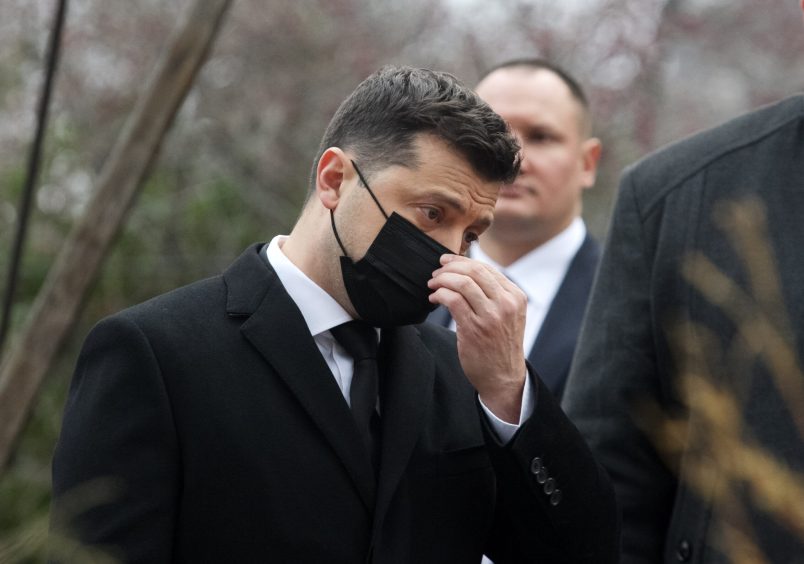The Republican Party can’t figure out what to do on Ukraine.
A yawning split has emerged. On one side is the MAGA right, skeptical of any U.S. support for Ukraine. On the other are Republicans animated by ideas that linger from the pre-Trump GOP, including a blind commitment to American intervention overseas, regardless of the cost.
It’s produced some fiery exchanges.
“I would not rule out American troops on the ground,” mused Sen. Roger Wicker (R-MS), a member of the armed service committee, in a December Fox interview.
“We don’t rule out first-use nuclear action,” he added.
That prompted denunciation from none other than MAGA celebrity Michael Flynn. “First-use nuclear action rhetoric is not only extremely dangerous, but these types of nonsensical remarks also threaten the stability of the entire world,” the retired general and Big Lie booster observed.
Tucker Carlson’s show on Fox News has gotten the most attention as an example of the MAGA side, as he downplays the idea that Ukraine — or the people therein — have any importance beyond that country’s borders.
“Why is it important enough to risk American lives to preserve the territorial integrity of Ukraine when by the way our own territorial integrity has been flagrantly violated by a million foreign nationals coming in over the past 10 months?” Carlson asked in November, pressing Rep. Mike Turner (R-OH), the ranking member of the House Intelligence Committee.
What the rants reveal is a fundamental split within the conservative movement over how to approach the problem of Ukraine, as Russia masses more than one hundred thousand troops on the country’s border.
Though not a formal ally of the U.S., questions around whether and how to help defend the country from Russian aggression have riven American domestic politics in a series of increasingly bizarre ways going back to 2014. Some reports indicate that Putin’s decision to intervene in the 2016 election on Trump’s behalf was motivated in part by this exact tension: The reality television star and real-estate developer had declared his skepticism of NATO, and of U.S. support for Kyiv.
At first, in the years immediately after Russia’s 2014 invasion of Ukraine, Trump was an outlier. Most of the Republican Party criticized then-President Obama for backing what they saw as a tepid, feckless response.
But while the party writ large remained antagonistic toward Russia, its derision for the Democratic President sometimes expressed itself as admiration for Putin.
Putin is “what you call a leader,” Rudy Giuliani marveled during the annexation of Crimea.
“The perception of him and his potency across the world is one of such weakness,” Sarah Palin said of Obama during a 2014 appearance on Sean Hannity’s show. “And you know, look, people are looking at Putin as one who wrestles bears and drills for oil.”
With Russian interference in the 2016 election coming in support of Trump, a candidate who expressed skepticism of the U.S. presence in Europe while also honing the culture war to an art, the two positions began to merge: Ukraine became part of the country’s domestic culture war.
Trump’s first impeachment stoked that trend, in part because it revolved around an attempt by Trump himself to substantiate an absurd series of Ukraine-related allegations involving Biden and his son. The doings of Hunter Biden himself — lending his name to the board of a corrupt Ukrainian gas firm — only poured gasoline on the issue.
That’s resulted in a bizarre split, Axios reported, between the party’s base — fed on these narratives for years — and its establishment, which essentially knows them to be untrue, and advocates for a strong military posture towards Russia over Ukraine that Biden appears to find too aggressive.
“I really hope that Republican primary voters are ruthless about this,” Carlson told Axios, framing the discussion as between rank-and-file voters and elected Republicans who believe “Ukraine’s borders are more important than our borders.”
Steve Bannon, in a Tuesday episode of his War Room: Pandemic podcast, laid into the Ukraine topic as a distraction from the communist threat in China, though through a prism that appropriately dated his perspective.
Bannon began by remarking that “Dr. Zhivago was on Turner Classic Movies the other night.”
“Remember, in Zhivago, when the army collapses and the peasants start to take over the army? Zhivago says: yeah, I served for years in the Ukraine. In Ukraine, okay?” Bannon said.
“It’s a killing field!” he added. “It’s a killing field from time immemorial! They have vendettas there that have come down through the centuries.”
Bannon concluded by observing that most NATO members do not contribute the minimum two percent of their GDP to the organization. That, he argued, was a reason to hold back — to let Ukraine, and it’s “killing fields,” stay “over there,” and to keep the focus squarely at home.
“Remember, we’re all supposed to worship at the altar of NATO,” Bannon added.






